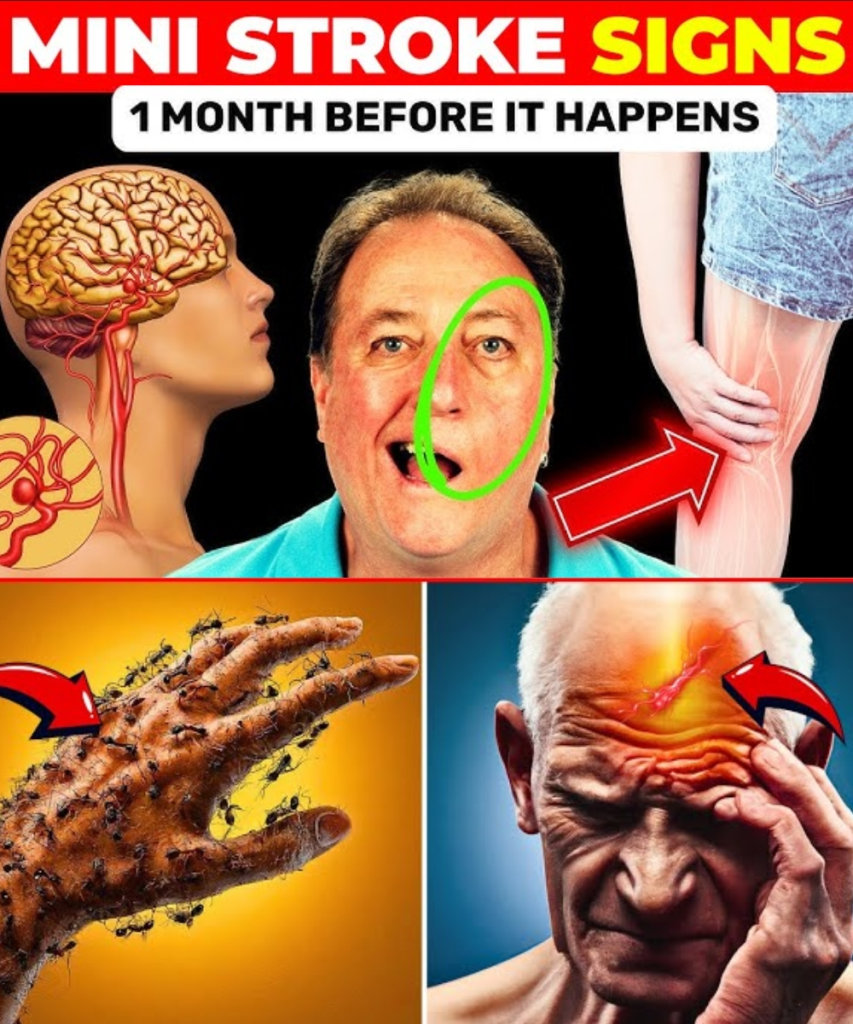Amini stroke—also called a Transient Ischemic Attack (TIA)—might seem harmless because its symptoms often disappear within minutes. But don’t be fooled: it’s your body’s loudest whisper that a major stroke could be coming next. And fast.

What Exactly Is a Mini Stroke?
Think of it as a warning shot. A TIA happens when blood flow to part of your brain gets blocked temporarily. It doesn’t cause lasting damage like a full stroke, but it signals that something serious is going on. In fact, many people who have a major stroke experience a TIA first—often within just 48 hours to 3 months.
⚠️ 8 Silent Signs of a Mini Stroke You Should Know
1. 🧠 Sudden Confusion or Slurred Speech
If you—or someone you’re with—suddenly can’t speak clearly or seems confused when forming words or sentences, don’t wait. It could be a TIA, not just fatigue or stress.
2. 👀 Vision Changes
Blurred or double vision in one or both eyes—or a momentary blackout in vision—can be easy to dismiss. But if it happens suddenly, it could be your brain crying for help.
3. 🤕 Dizziness or Loss of Balance
Feeling light-headed or having trouble walking straight for no obvious reason? That sense of “wooziness” might actually be a neurological red flag.
4. 💪 Numbness or Weakness on One Side
Classic TIA sign. If your arm, leg, or even just your face feels weak or numb—especially on just one side of your body—get medical attention ASAP.
5. ⚡ Sudden, Intense Headache
A sharp headache that hits you out of nowhere—and doesn’t feel like your typical migraine—might be something more serious.
6. ❓ Trouble Understanding Others
Can you hear people speaking but struggle to make sense of their words? That disconnect might signal temporary brain disruption from a TIA.
7. 😐 One-Sided Facial Drooping
Look in the mirror and smile. If one side of your mouth isn’t moving, or your face looks uneven, that’s a major warning sign.
8. 💤 Extreme Fatigue or Tiredness
Unexplained exhaustion that hits you like a wall—especially if paired with any other symptoms—is often overlooked, but it’s common after a mini stroke.
🚑 Why Early Detection Is Crucial
According to the American Stroke Association, 1 in 3 people who have a TIA will go on to suffer a full stroke, often within days. Recognizing these early signs and getting help quickly could mean the difference between full recovery and lifelong complications—or worse.
✅ What to Do If You Suspect a Mini Stroke
Remember the FAST acronym:
- Face drooping
- Arm weakness
- Speech difficulty
- Time to call emergency services
Don’t “wait and see.” Even if symptoms vanish, call for help immediately. Every minute counts.
🛡 Can You Prevent a Mini Stroke?
Absolutely. Start with small, powerful changes:
- Keep your blood pressure in check
- Control blood sugar and cholesterol
- Stop smoking
- Eat heart-healthy foods
- Stay active
- Manage stress levels
💬 Final Thoughts
A mini stroke might seem like no big deal—but it’s your body’s way of flashing a red light. Don’t ignore these quiet but critical signals. Take action now, and you might just prevent a life-altering event.


